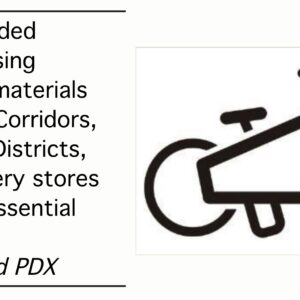
(Photo: Jonathan Maus/BikePortland)
After three years at the helm of The Street Trust, Executive Director Jillian Detweiler plans to leave the organization. “It is the right time for me to step down,” she said in a statement released Friday.
The Street Trust, which was known as the Bicycle Transportation Alliance before a name and mission change in 2016, is a Portland-based nonprofit that aims to improve bicycling, walking, and transit.
Instead of searching for a new leader, The Street Trust has named three current staffers to new “co-director” positions. Current Advocacy Director Richa Poudyal, Development Director Tia Sherry, and Director of Finance and Operations Greg Sutliff will “embrace a new leadership model.” The staffers will maintain their current responsibilities and split ED duties.
“The response to combined economic, public health, climate, and social justice crises must drive transformation to a just community rather than restore a normal that was not working for so many,” Detweiler said about her departure. “The Street Trust will promote its mission with a management team that shares power and reflects the changes we would like to see in society.”
Advertisement

The Street Trust’s Programs and Events Director Judge Kemp added that, “As The Street Trust works to center transportation justice, we must challenge traditional power structures that have shaped transportation policy, infrastructure, and spaces. A shift towards shared leadership is one way for The Street Trust to lean into transportation justice internally and respond to the systems that need to change.”
Detweiler was hired in 2017 after the dismissal of former ED Rob Sadowsky and had previously worked as a senior planner at Trimet and policy director for former Portland Mayor Charlie Hales.
During her tenure, The Street Trust launched a political action fund and lobbied the Oregon Legislature to help pass a number of laws including a clarification to Oregon’s bike lane law and lower speed limits. The organization was also part of a coalition that helped craft and support Metro’s “Get Moving 2020” investment measure that will be on the ballot in November.
As for why she chose to move on, Detweiler said “financial headwinds” caused by the Covid-19 pandemic were part of the decision, but that the organization is “in a stable financial position” due to donations and a federal Paycheck Protection Program loan.
“It’s the right time [to step down],” Detweiler said, “Because The Street Trust has staff ready to lead. I wanted to give new leadership the longest runway I could to take off.”
Detweiler’s last day will be August 14th.
— Jonathan Maus: (503) 706-8804, @jonathan_maus on Twitter and jonathan@bikeportland.org
— Get our headlines delivered to your inbox.
— Support this independent community media outlet with a one-time contribution or monthly subscription.







Thanks for reading.
BikePortland has served this community with independent community journalism since 2005. We rely on subscriptions from readers like you to survive. Your financial support is vital in keeping this valuable resource alive and well.
Please subscribe today to strengthen and expand our work.
What was useful about having one executive director was that they could easily be quoted in the news about projects. It will be interesting to see how this model changes the voice of the street trust. Best of luck to the new leadership team and look forward to having a strong voice for transportation!
Even for small organizations the obligations around board reporting and board management are incredibly complicated and time consuming. I hope TST has a very knowledgeable and involved board to navigate this unorthodox arrangement. Also, the three managers who are now running it will need to have a good plan to not be sending contradictory messages or duplicating work when reporting to the board.
Honestly ever since they changed their name/focus I’ve pretty much lost any interest in the organization. I have no clue what they do any more and no longer donate to them. They don’t seem to be as involved in the local bicycle events as they used to be.
I always distrust groups whose name is a platitude that their opponents might just as easily use, instead of calling themselves what they actually are. Seems to me the name change confirmed the BTA’s status as a group unwilling to stick its neck out. But groups like this can still be useful in winning over the mainstream for incremental change – especially if you have a more demanding group like BikeLoudPDX pushing for major changes, giving moderates cover to at least support the incremental changes. Good to have both, even if me BikeLoud comes a lot closer to my vision of what needs to be done.
I thought it was pretty clear at the time that Sadowski was brought in to change the name in an attempt to increase revenue, which was confirmed when he changed the logo to eliminate the bicycle wheel prior to the name change. I recall asking the BTA directly if this was part of a rebrand to more of a complete streets org instead of bike focused and being falsely assured that it wasn’t… He got the name changed, but many people felt deceived by the manner in which he did it and the tactics used. Of course if revenue jumped at least he would have accomplished something, but I think that under Bricker they had about 1.5 million a year in revenue, by the time Sadowski got fired they were down more than 20% which is probably why he was tossed out and looking at the financials on the street trust website it seems to have continued going down. You can maybe blame the economy for some of the downturn early in Sadowski’s tenure but that is clearly not the only factor. I think they overestimated their ability to gain paying non-cyclist members and underestimated how moving away from cycling advocacy would cause people to put their energy and money other places. Personally I wonder if they had given Bricker a bit more time to grow into the role if things wouldn’t be a lot different now.
I’m with you, Jon. One line from their statement, which reads, ” … one way for The Street Trust to lean into transportation justice internally,” is by itself almost enough for me to quit supporting them.
My perception of Jillian as ED of The Street Trust is a long list of positive attributes that starts with the words “inclusive” and “accessible”. I will miss her.
One thing I noticed while looking through their financials is that it also appeared Jillian was basically doing the job at charity wages. For free some years and for less than 1/3 of what Sadowski was being paid others. No one should be faulting her effort or commitment imho. Unfortunately that also means that her leaving isn’t the financial windfall that one might expect from losing an ED and not replacing her.
You’re mis-reading their 990s. The most recent 990 on Guidestar runs from 9/1/17 to 8/31/18 and the section reporting Jillian’s compensation indicates that the wages shown are from the 2017 calendar year. Since Jillian started in August of 2017, the compensation shown is just for five months of work—so it looks like she was paid just about the same as Sadowsky.
I am not seeing where it says that her compensation is only for the calendar year. The document says right at the top that it covers the fiscal year of the organization which is Sep 1, 2017 to aug 31 2018. The 990 from the year before where she was only ED part of the year also lists her as the ED but reports no compensation. You may be right but if you look in the compensation section (VII) it says it should cover either calendar year or tax year and it seems odd for them not to be consistent throughout the document. The 990’s I am looking at are from their website: https://www.thestreettrust.org/financials
The second sentence of Part VII reads “Report compensation for the calendar year ending with or within the organization’s tax year”. Since the organization’s tax year was 9/1/17-8/31/18, the calendar year “ending with or within” would be the 2017 calendar year. As mentioned before, Jillian joined TST in August of 2017, which means that the wages reported are just for 5 months.
The 990 from the year before covers 9/1/16-8/31/17 and reports compensation for the 2016 calendar year, which is before Jillian started at TST, which is why no compensation is shown. She is still listed in Part VII that year, though, because the instructions at the top of the section clearly state that the list shall contain all of the organization’s current directors and officers—and since the report was probably submitted many months after the close of the fiscal year, Jillian probably was current (i.e. on staff at the time that the report was prepared and submitted)
I went back and looked at this carefully and I now believe that Carl is correct. It is a bit confusing that they report her as working 40 hours per week and getting 0 dollars in the FY 2016-2017 report but based on her start date and a careful reading of the section I think that her salary is similar to Rob’s and what was reported for FY 2017-2018 simply represents ~1/3 of a year’s work.
One of the challenges that organizations that have paid staff like the Street Trust and People for Bikes face is that of the mission creep of chasing dollars and grants to pay for ongoing staffing, versus focusing on effective advocacy and efforts towards one’s core mission. I’ve seen far to many organizations spend the majority of their time and staff efforts on getting the next round of funding, grants, and donations to keep their jobs and benefits, but at a cost of largely neglecting to advocate effectively, to try new strategies and techniques, and building alliances for bi-partisan endeavors.
We should mention the cost of the “trust” having to lick the boots of the owner “ODOT/PBOT” the city/state who feeds you. There is a decade of bike Portland articles where I’ve noticed the Trust/BTA going soft on a clear conflict of interest.
I don’t have a degree in business or anything, but I would think that it would be difficult for an organization to “advocate effectively, try new strategies and techniques, and build alliances for bi-partisan endeavors” without having money to pay staff to do those things.
Sure, you could have an all-volunteer-run organization, but all that means is that the organization’s work would primarily be driven by people privileged enough to be able to spend a bunch of time providing free labor, i.e. primarily white men.
She has a legacy of double speak. She wrote this memo, then deleted it. URL below. This is a pattern with the BTA/StreetTrust or whatever you seek to re-brand a bunch of moderates. Portland should be downgraded. Trying to get over 405 using Couch is getting a bike bike upgrade… ooops. in BTA speak that means bikes duke it out with an intersection that includes no signal and a freeway on ramp. I can name endless examples of why we should downgrade Portland’s status as a bike city.
https://web.archive.org/web/20181220164328/https://www.thestreettrust.org/2017/08/the-future-of-the-rose-quarter/
The Street Trust has an entirely new website now, which is why that article is not found on their current website.
Yes Carl. We agree but the half truth is that NGO websites always move. And for transparency they move their old content to the new page, but really just the old content their leaders select. I’ve done many NGO website conversions from one CMS to another.
ps: Is that you CL? The one who made the BTA video about missing a tail light? I won’t out you, but why are you here defending an NGO that let the cops and city go off without a mention when a pedestrain on a sidewalk is killed by a driver, and the driver is not even cited, and the Mayor’s office, when confronted, says “No laws were broken” Why Carl do you put your energy into this dead end NGO that does not stand up for voiceless victims it collects money to defend?
Over the past couple of years The Street Trust was heavily involved in organizing the Getting There Together Coalition http://www.gettingtheretogether.org/coalition/ that helped shape the $5 Billion Metro Transportation measure on your ballots in November.
https://bikeportland.org/2020/07/17/metro-council-votes-to-send-5-billion-transportation-investment-package-to-voters-318590
From Jonathan: The Getting There Together coalition deserves high praise for their work in bending the proposal away from traditional driving and highway-centric projects and toward basic safety (like street lighting, better bike lanes and sidewalks) and major transit upgrades.
And Metro was intentional to make sure the investments went in places that will benefit low-income and people of color. 68% of the region’s people of color live in the areas targeted for funding and new infrastructure. Transit investments — including 85% of new transit signal priority projects and 59% of new bus lanes — are strongly weighted toward areas where people of color live.